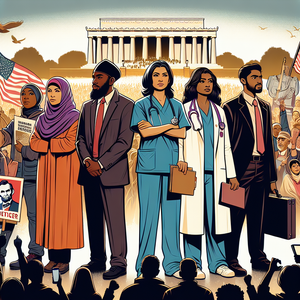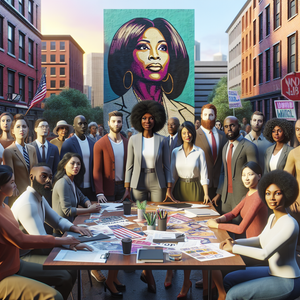
Career Paths Inspired by the Legacy of the March on Washington: A Commitment to Social Justice
The March on Washington for Jobs and Freedom, held on August 28, 1963, stands as a pivotal moment in the history of the American civil rights movement. Drawing over 250,000 participants, this monumental event was not just a protest but a profound demonstration advocating for racial equality, fair employment, and social justice. Spearheaded by influential figures like Martin Luther King Jr., whose iconic "I Have a Dream" speech resonated with the aspirations of many, the march brought significant attention to pressing social issues and laid the groundwork for transformative legislation such as the Civil Rights Act of 1964 and the Voting Rights Act of 1965. The demands articulated during this historic gathering continue to inspire a wide array of career opportunities in civil rights and social justice, where passionate individuals can make impactful contributions. This article delves into several career paths that embody the spirit of the March on Washington, emphasizing the skills, education, and dedication required to champion equality and justice.
Job Summaries:
Civil Rights Advocate:
- Civil rights advocates work tirelessly to protect the rights of marginalized communities.
- Conducting research on discrimination.
- Advocating for policy changes.
- Collaborating with legal teams.
- A degree in social justice or law is typically essential.
- Strong analytical and communication skills are important.
- This role is critical in perpetuating the ideals of the March on Washington.
- Ensuring that the fight for equality remains vibrant.
Community Organizer:
- Community organizers play a vital role in mobilizing individuals around social justice issues.
- They engage directly with local communities.
- They design grassroots campaigns and facilitate meetings to address community needs.
- A background in sociology or political science can be beneficial.
- Strong interpersonal skills are important.
- This position embodies the community spirit that underpinned the March on Washington.
Policy Analyst:
- Policy analysts evaluate legislative policies related to civil rights.
- Conducting research to inform recommendations for change.
- They prepare reports and work with lawmakers to advocate for effective policies.
- Typically, this role requires a master's degree in public policy or a related field.
- Along with robust research capabilities.
- Analysts help shape policies that reflect the principles advocated during the march.
Nonprofit Program Director:
- Nonprofit program directors oversee initiatives that focus on social justice.
- They manage budgets and coordinate staff to ensure alignment with the organization’s mission.
- A degree in nonprofit management or social work is often necessary.
- Leadership and organizational skills are important for this role.
- This role reflects the spirit of the March on Washington by directing efforts toward addressing systemic inequities.
Human Rights Lawyer:
- Human rights lawyers engage in legal advocacy for civil rights violations.
- They represent clients in court and pursue systemic reforms.
- This career requires a law degree and bar admission.
- A passion for social justice is essential.
- Strong legal research skills are necessary.
- It is essential for upholding the rights championed during the march.
Social Justice Educator:
- Social justice educators are committed to teaching the principles of equality and civil rights.
- They develop curricula that address historical injustices and foster civic engagement.
- A degree in education or social sciences is necessary, along with teaching credentials.
- This role plays a crucial part in passing on the values of the March on Washington to future generations.
Advocacy Coordinator:
- Advocacy coordinators manage campaigns that influence public policy and raise awareness of social justice issues.
- They work closely with stakeholders to develop strategies for action.
- A background in communications or political science is advantageous, alongside project management skills.
- This role ensures that the messages from the march resonate with a broader audience.
Diversity and Inclusion Officer:
- Diversity and inclusion officers promote equitable practices within organizations.
- They assess compliance with diversity standards.
- They create training programs.
- A degree in human resources or business administration is typically required.
- Experience in diversity initiatives is necessary.
- This role is vital for fostering inclusive environments.
- The role reflects the ideals of the March on Washington.
Grant Writer for Social Justice Organizations:
- Grant writers play a crucial role in securing funding for civil rights organizations.
- They research opportunities and craft compelling proposals.
- Strong writing and research skills are essential.
- A background in nonprofit management or communications is important.
- This role supports the sustainability of initiatives that carry forward the legacy of the March on Washington.
Civil Rights Researcher:
- Civil rights researchers conduct studies on historical and contemporary civil rights issues.
- They provide valuable insights that can inform advocacy efforts.
- A graduate-level background in sociology or political science is often required.
- This role is essential for understanding the ongoing impact of the march.
- It helps in shaping future advocacy strategies.
Pursuing these career paths offers individuals a meaningful opportunity to contribute to the ongoing quest for justice and equality. By recognizing the historical significance of the March on Washington and its lasting impact, aspiring advocates can align their professional aspirations with the principles of civil rights and social justice. As society continues to grapple with issues of inequality, these roles remain crucial in fostering a culture that honors the demands for jobs and freedom articulated in 1963. Whether through advocacy, education, or legal representation, every career in this field provides a platform to uphold the legacy of the March on Washington for Jobs and Freedom, driving forward the ideals of equity and justice for all.
Explore More Jobs

